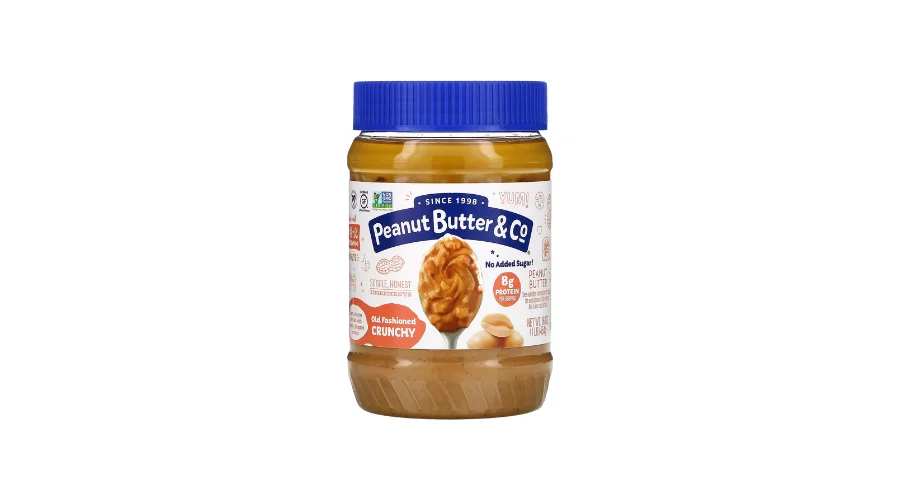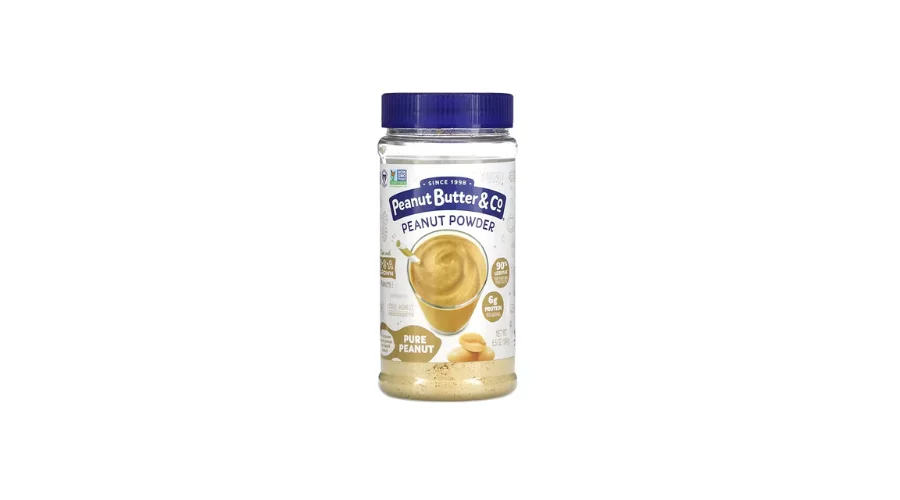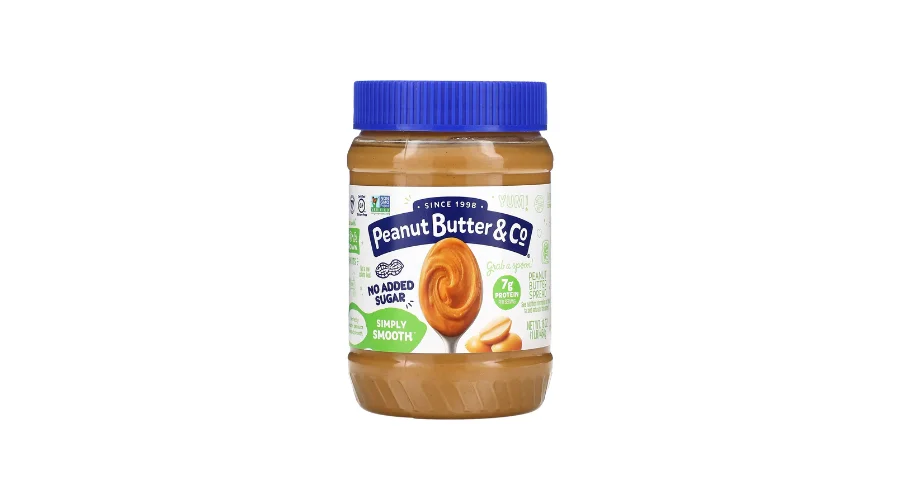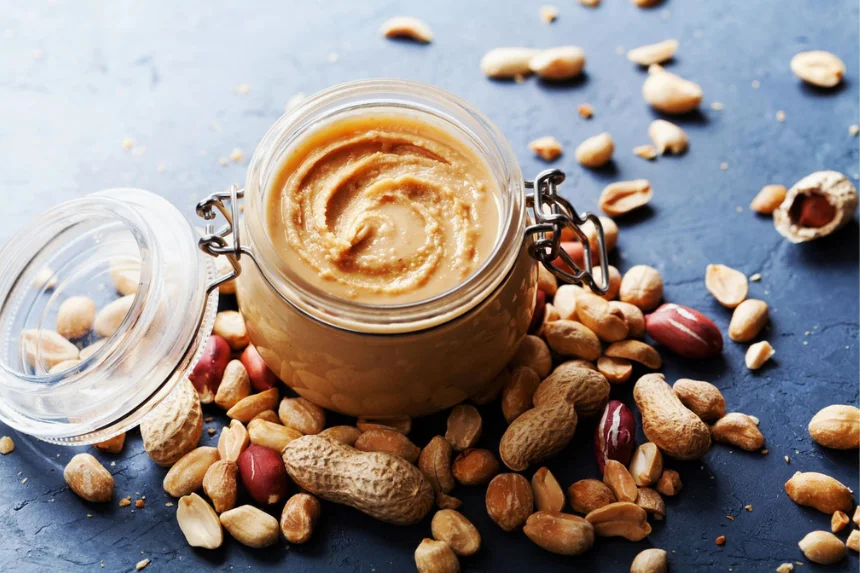Peanut butter, that creamy, nutty spread adored by many, is more than just a sandwich filling. It’s a versatile and nutrient-rich food that deserves a spotlight in your diet. Roasted peanuts are used to make peanut butter, a spread. These legumes are ground into a paste, which can be enjoyed in various ways, from sandwiches and toast to baking and cooking. Peanut butter is available in both creamy and crunchy varieties, catering to different texture preferences.
How Is Peanut Butter Made?
The production of peanut butter is a straightforward yet fascinating process:
- Harvesting and Shelling: Peanuts are grown and harvested primarily in warm climates. Once harvested, they are removed from their shells, leaving behind the edible kernels.
- Roasting: The peanuts are roasted, enhancing their flavor and aroma. Roasting also reduces moisture content, aiding in the blending process.
- Grinding: The roasted peanuts are ground into a paste using specialized machinery. The degree of grinding determines the texture of the peanut butter—whether it’s creamy or crunchy.
- Additional Ingredients: Depending on the desired taste and texture, some peanut butter varieties may include additional ingredients like salt, sugar, or stabilizers.
- Packaging: The final product is packaged in jars, ready to be enjoyed by peanut butter enthusiasts worldwide.
Is Peanut Butter Healthy, or Is It High in Calories and Fats?
The reputation of peanut butter as a healthy or calorie-rich option can be a source of confusion. Let’s break it down:
- Nutrient Profile:
Peanut butter is, indeed, calorie-dense and contains a significant amount of fats. However, not all fats are created equal. Peanut butter primarily consists of monounsaturated and polyunsaturated fats—the heart-healthy fats that can help reduce the risk of cardiovascular diseases. It also contains essential nutrients such as protein, fiber, vitamins (like vitamin E and niacin), and minerals (such as magnesium and potassium).
- Caloric Content:
While peanut butter is calorie-dense, it’s essential to remember that portion size matters. A serving of peanut butter (usually two tablespoons) provides around 190 calories. Moderation is key to incorporating peanut butter into your diet without exceeding your calorie goals.
- Protein Powerhouse:
Peanut butter is an excellent source of plant-based protein, making it a suitable option for vegetarians and vegans. Protein is crucial for immune system functioning, muscle regeneration, and general wellbeing.
- Satiety and Weight Management:
Thanks to its protein and healthy fat content, peanut butter can help you feel full and satisfied. Including it in your meals or snacks may prevent overeating and support weight management when consumed in moderation.
What are the nutritional benefits of consuming peanut butter?
Now that we’ve clarified that peanut butter is indeed calorie-dense and rich in fats, let’s delve deeper into its nutritional benefits, dispelling any misconceptions and highlighting its positive contributions to your health.
- Rich in Healthy Fats: While peanut butter contains fats, these are primarily monounsaturated and polyunsaturated fats. These are the types of fats that can be incredibly beneficial for your health. Research suggests that diets rich in these fats can help reduce the risk of heart disease, lower bad cholesterol levels, and improve overall cardiovascular health.
- High in Protein: Protein is an essential component of your diet, and peanut butter provides a significant source of it. For those who follow vegetarian or vegan diets, peanut butter is a valuable plant-based protein source. Protein plays a crucial role in muscle repair and growth, immune function, and the production of enzymes and hormones in your body.
- Nutrient-Rich: Peanut butter is not just about fats and protein; it’s a package of essential nutrients. Vitamin E, an antioxidant that aids in preventing cell deterioration, is present in it. Additionally, it provides niacin, a B vitamin that aids in converting food into energy. Peanut butter is also a source of magnesium, which is essential for muscle and nerve function, and potassium, important for maintaining healthy blood pressure.
- Dietary Fiber: Fiber is crucial for a well-functioning digestive system, and peanut butter offers a respectable amount of it. Fiber aids in preventing constipation, promotes regular bowel movements, and supports a healthy gut microbiome.
- Antioxidant Properties: Peanuts and, consequently, peanut butter, contain antioxidants like resveratrol. While not as abundant as in red grapes or wine, resveratrol has gained attention for its potential health benefits. It’s been associated with heart health and longevity. While more research is needed, having it in your diet via peanut butter can be seen as a positive.
- Arginine Content: Peanut butter contains arginine, an amino acid that is involved in many bodily processes, including wound healing, immune function, and hormone regulation. Arginine may have a role in cardiovascular health by promoting healthy blood flow and blood vessel function.
Best Peanut Butter by Iherb
1. PEANUT BUTTER & CO., OLD FASHIONED CRUNCHY, PEANUT BUTTER, 16 OZ (454 G)

Crafted from peanuts grown in the USA, this peanut butter is a testament to quality. It proudly bears certifications as vegan, gluten-free, and Non-GMO Project Verified, showcasing its commitment to dietary preferences and responsible sourcing. With a focus on simple and honest ingredients, it combines creamy peanut butter with crunchy, chopped peanuts for an enticing texture. Importantly, this peanut butter contains no added sugar, appealing to those seeking a more health-conscious option.
2. PEANUT BUTTER & CO., PEANUT BUTTER SPREAD, DARK CHOCOLATE DREAMS, 16 OZ (454 G)
This product proudly holds the Non-GMO Project Verified seal, a testament to its commitment to responsible sourcing. In production since 1998, it offers 6 grams of protein per serving, making it a nourishing choice. With certifications as kosher, vegan, and gluten-free, it caters to various dietary preferences. Made from USA-grown peanuts and featuring simple, honest ingredients, it maintains a commitment to quality. Notably, it contains 70% peanuts and uses RSPO Certified Sustainable Palm Oil. What sets it apart is the delightful blend of peanuts with rich cocoa, delivering a delectable dark chocolate flavor.
3. PEANUT BUTTER & CO., PEANUT POWDER, PURE PEANUT, 6.5 OZ (184 G)

In existence since 1998, this product proudly boasts certifications as gluten-free, vegan, and Non-GMO Project Verified, aligning with diverse dietary preferences. Crafted from roasted peanuts, it’s pressed into peanut powder, offering a versatile ingredient for various culinary endeavors. Remarkably, it contains 90% less fat than traditional peanut butter while delivering 6 grams of protein per serving. It is also kosher, making it suitable for various dietary needs. Whether you choose to blend it into smoothies, bake with it, or simply spread it, this peanut powder invites you to savor and love its culinary potential.
4. PEANUT BUTTER & CO., ALMOND BUTTER SPREAD, 16 OZ (454 G)
This almond butter is a testament to quality and dietary considerations. Certified gluten-free and vegan, it bears the Non-GMO Project Verified seal, ensuring responsible sourcing. Crafted from almonds grown in the USA and featuring simple, honest ingredients, it’s created by skillfully grinding perfectly roasted almonds to achieve a smooth texture. With no added sugar and kosher certification, it caters to various dietary needs and preferences. Notably, it’s peanut-free and utilizes RSPO Certified Sustainable Palm Oil. This almond butter offers a rich and flavorful experience, created by blending roasted almonds with sea salt, resulting in a no-stir, natural tree nut butter.
5. PEANUT BUTTER & CO., PEANUT BUTTER SPREAD, SIMPLY SMOOTH, 16 OZ (454 G)

This peanut butter takes pride in its commitment to quality and dietary preferences. Certified vegan, gluten-free, and Non-GMO Project Verified, it reflects responsible sourcing and diverse dietary needs. Crafted from USA-grown peanuts, perfectly roasted to a smooth blend, it maintains a focus on simplicity and honest ingredients. Featuring 7 grams of protein per serving and containing 95% peanuts, it’s a protein-rich and wholesome choice. Additionally, it holds kosher certification and utilizes certified sustainable palm oil, ensuring a well-rounded and ethical peanut butter experience with no added sugar.
Can Peanut Butter Be Part of a Balanced Diet, Especially for Weight Management?
The short answer is yes! Peanut butter can absolutely be part of a balanced diet, and here’s how to incorporate it wisely:
- Watch Your Portions: Stick to the recommended serving size of around two tablespoons to control calorie intake.
- Choose Natural Varieties: Opt for natural peanut butter with minimal added ingredients. These options typically contain only peanuts and sometimes, a pinch of salt.
- Pair with Whole Grains: Spread peanut butter on whole-grain toast or whole-wheat crackers for a satisfying and nutritious snack or breakfast.
- Blend in Smoothies: Add a tablespoon of peanut butter to your morning smoothie to enhance flavor, protein content, and creaminess.
- Incorporate in Cooking: Peanut butter can be used in savory dishes like Thai peanut sauce or satay. It’s a versatile ingredient that adds flavor and richness to your recipes.
- Snack Smart: Pair peanut butter with apple slices, celery sticks, or carrot sticks for a balanced and satisfying snack.
Conclusion
Peanut butter offers a range of nutritional benefits, from healthy fats and protein to essential vitamins and minerals. While it is calorie-dense, it can be part of a balanced diet when consumed in moderation. The key is to choose natural varieties and watch your portion sizes. By doing so, you can savor the nutty goodness of peanut butter while reaping its health advantages. For a wide selection of peanut butter products and other dietary options, iHerb provides excellent choices, ensuring that you can enjoy the goodness of peanut butter in various forms and flavors.








